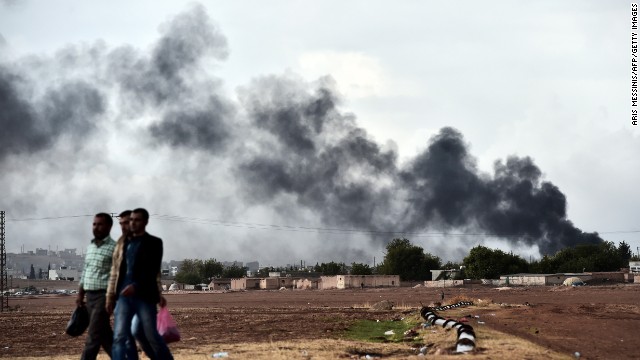 Kurdish men walk near the Turkish-Syrian border as smoke rises from the Syrian town of Kobani, as seen from the southeastern village of Mursitpinar, Turkey, on October 16. Civil war has destabilized Syria and created an opening for the ISIS militant group, which is also advancing in Iraq as it seeks to create an Islamic caliphate in the region.
Kurdish men walk near the Turkish-Syrian border as smoke rises from the Syrian town of Kobani, as seen from the southeastern village of Mursitpinar, Turkey, on October 16. Civil war has destabilized Syria and created an opening for the ISIS militant group, which is also advancing in Iraq as it seeks to create an Islamic caliphate in the region.  Cundi Minaz, a female Kurdish fighter, is buried in a cemetery in the southeastern Turkish town of Suruc on Tuesday, October 14. Minaz was reportedly killed during clashes with ISIS militants in nearby Kobani, Syria. Civil war has destabilized Syria and created an opening for the ISIS militant group, which is also advancing in Iraq as it seeks to create an Islamic caliphate in the region.
Cundi Minaz, a female Kurdish fighter, is buried in a cemetery in the southeastern Turkish town of Suruc on Tuesday, October 14. Minaz was reportedly killed during clashes with ISIS militants in nearby Kobani, Syria. Civil war has destabilized Syria and created an opening for the ISIS militant group, which is also advancing in Iraq as it seeks to create an Islamic caliphate in the region. 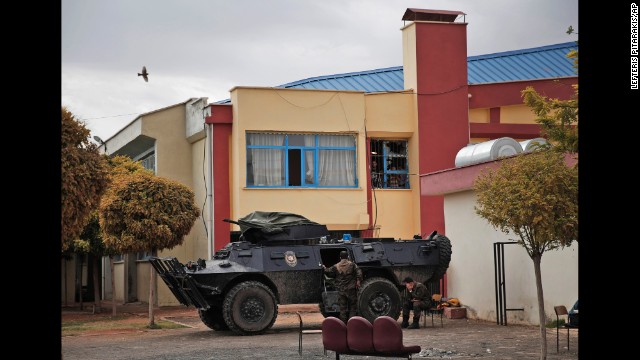 Turkish police officers secure a basketball stadium in Suruc on October 14. Some Syrian Kurds have been held there since crossing from Syria into Turkey. Tens of thousands of people have fled Kobani, known in Arabic as Ayn al-Arab, to escape ISIS.
Turkish police officers secure a basketball stadium in Suruc on October 14. Some Syrian Kurds have been held there since crossing from Syria into Turkey. Tens of thousands of people have fled Kobani, known in Arabic as Ayn al-Arab, to escape ISIS. 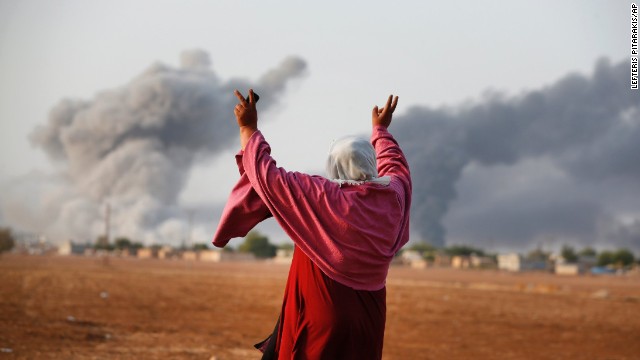 Kiymet Ergun, a Syrian Kurd, celebrates in Mursitpinar, Turkey, after an airstrike by the U.S.-led coalition in Kobani on Monday, October 13. The United States and several Arab nations have been bombing ISIS targets in Syria to take out the militant group's ability to command, train and resupply its fighters.
Kiymet Ergun, a Syrian Kurd, celebrates in Mursitpinar, Turkey, after an airstrike by the U.S.-led coalition in Kobani on Monday, October 13. The United States and several Arab nations have been bombing ISIS targets in Syria to take out the militant group's ability to command, train and resupply its fighters. 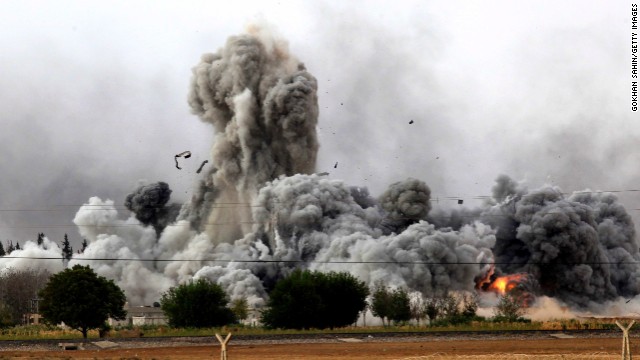 Smoke rises from Kobani on Sunday, October 12.
Smoke rises from Kobani on Sunday, October 12. 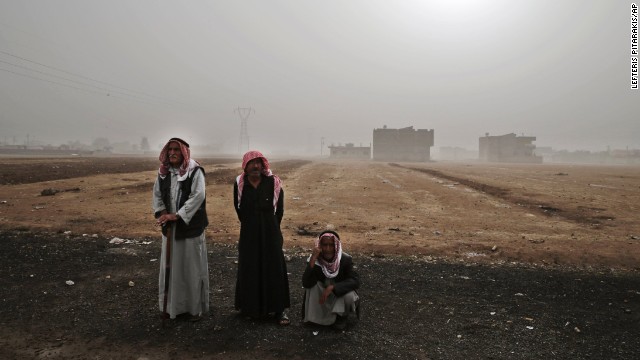 Syrian Kurds from Kobani stand outside the grounds of a refugee camp in Suruc on Saturday, October 11.
Syrian Kurds from Kobani stand outside the grounds of a refugee camp in Suruc on Saturday, October 11. 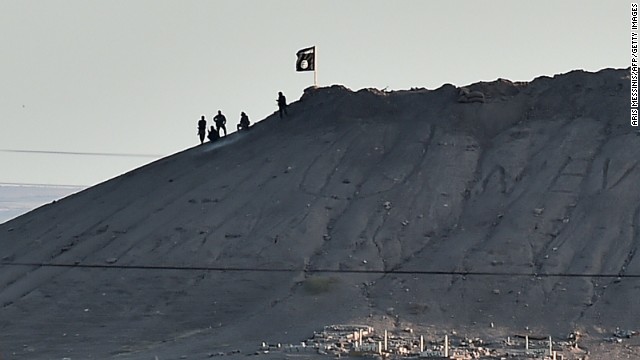 Alleged ISIS militants stand next to an ISIS flag atop a hill in Kobani on Monday, October 6.
Alleged ISIS militants stand next to an ISIS flag atop a hill in Kobani on Monday, October 6. 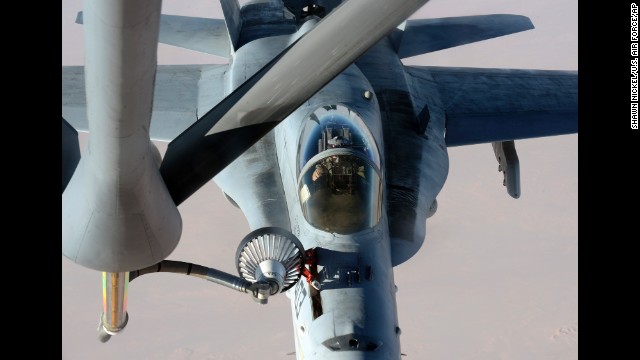 In this photo released by the U.S. Air Force on Saturday, October 4, a U.S. Navy jet is refueled in Iraqi airspace after conducting an airstrike against ISIS militants.
In this photo released by the U.S. Air Force on Saturday, October 4, a U.S. Navy jet is refueled in Iraqi airspace after conducting an airstrike against ISIS militants. 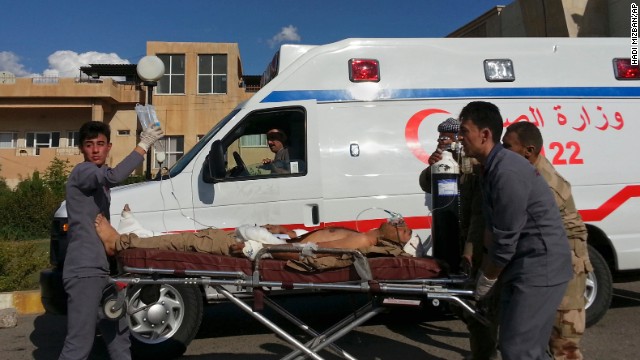 A Kurdish Peshmerga soldier who was wounded in a battle with ISIS is wheeled to the Zakho Emergency Hospital in Duhuk, Iraq, on Tuesday, September 30.
A Kurdish Peshmerga soldier who was wounded in a battle with ISIS is wheeled to the Zakho Emergency Hospital in Duhuk, Iraq, on Tuesday, September 30. 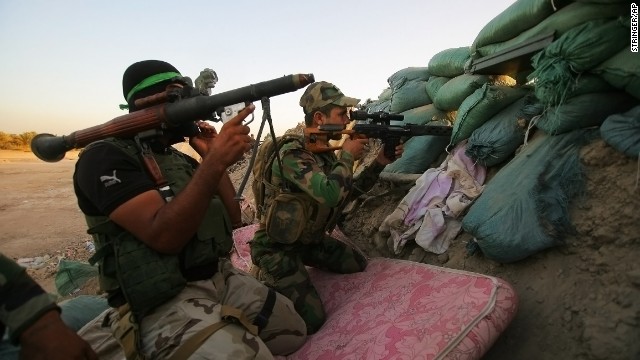 Iraqi Shiite militiamen aim their weapons during clashes with ISIS militants in Jurf al-Sakhar, Iraq, on Sunday, September 28.
Iraqi Shiite militiamen aim their weapons during clashes with ISIS militants in Jurf al-Sakhar, Iraq, on Sunday, September 28.  Syrian Kurds wait near a border crossing in Suruc as they wait to return to their homes in Kobani on Sunday, September 28. Tens of thousands of people have fled Kobani, known in Arabic as Ayn al-Arab, to escape ISIS.
Syrian Kurds wait near a border crossing in Suruc as they wait to return to their homes in Kobani on Sunday, September 28. Tens of thousands of people have fled Kobani, known in Arabic as Ayn al-Arab, to escape ISIS. 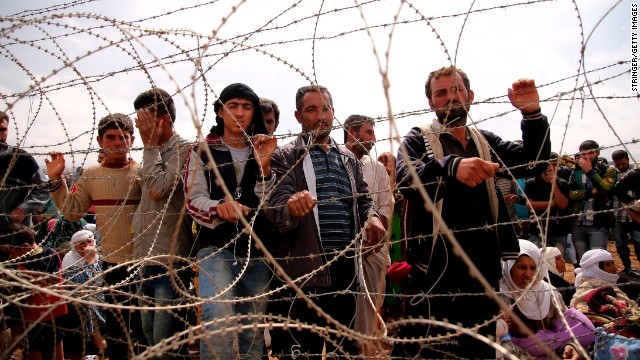 Syrian Kurds wait behind border fences to cross into Suruc on September 28.
Syrian Kurds wait behind border fences to cross into Suruc on September 28. 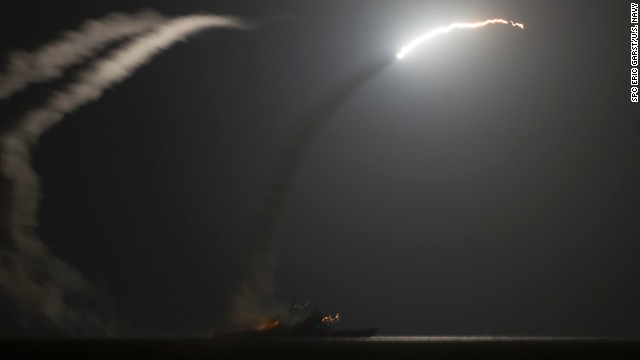 Tomahawk missiles, intended for ISIS targets in Syria, fly above the Persian Gulf after being fired by the USS Philippine Sea in this image released by the U.S. Navy on Tuesday, September 23.
Tomahawk missiles, intended for ISIS targets in Syria, fly above the Persian Gulf after being fired by the USS Philippine Sea in this image released by the U.S. Navy on Tuesday, September 23. 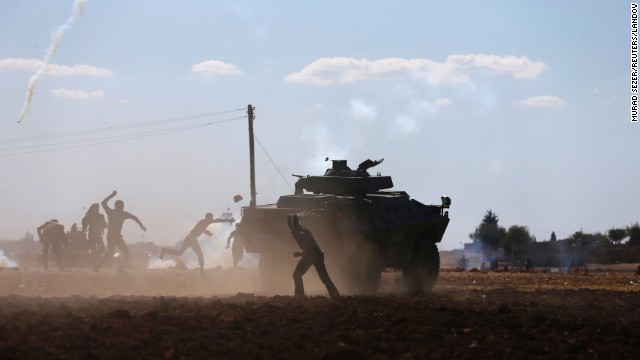 Turkish Kurds clash with Turkish security forces during a protest near Suruc on Monday, September 22. According to Time magazine, the protests were over Turkey's temporary decision to close the border with Syria.
Turkish Kurds clash with Turkish security forces during a protest near Suruc on Monday, September 22. According to Time magazine, the protests were over Turkey's temporary decision to close the border with Syria.  Syrian Kurds fleeing ISIS militants wait behind a fence in Suruc on Sunday, September 21.
Syrian Kurds fleeing ISIS militants wait behind a fence in Suruc on Sunday, September 21. 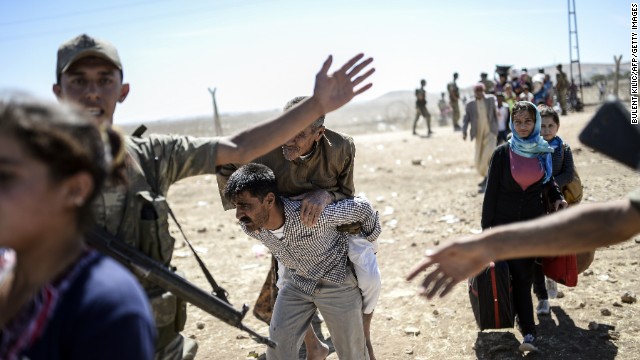 A elderly man is carried after crossing the Syria-Turkey border near Suruc on Saturday, September 20.
A elderly man is carried after crossing the Syria-Turkey border near Suruc on Saturday, September 20. 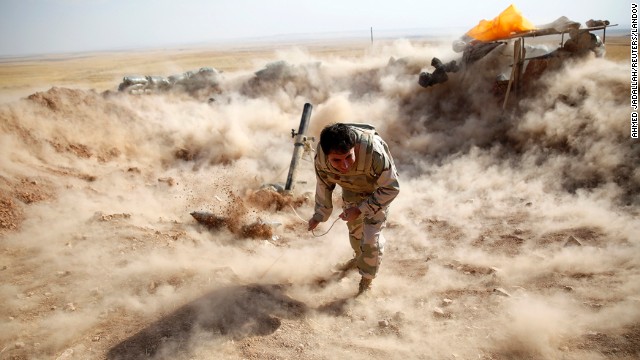 A Kurdish Peshmerga fighter launches mortar shells toward ISIS militants in Zumar, Iraq, on Monday, September 15.
A Kurdish Peshmerga fighter launches mortar shells toward ISIS militants in Zumar, Iraq, on Monday, September 15. 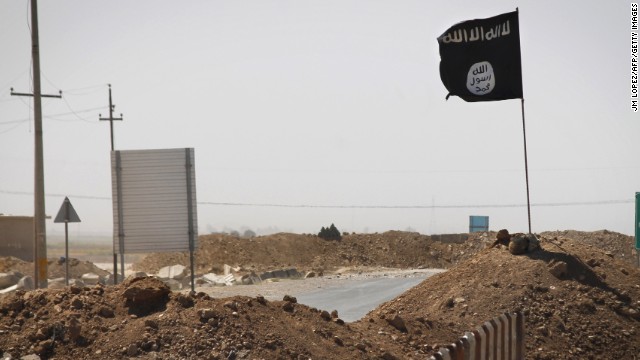 An ISIS flag flies on the other side of a bridge at the front line of fighting between ISIS and Kurdish Peshmerga fighters in Rashad, Iraq, on Thursday, September 11.
An ISIS flag flies on the other side of a bridge at the front line of fighting between ISIS and Kurdish Peshmerga fighters in Rashad, Iraq, on Thursday, September 11. 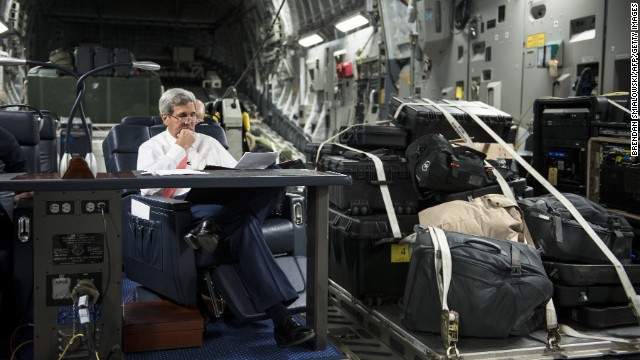 U.S. Secretary of State John Kerry reads on a flight en route to Iraq on Wednesday, September 10. Kerry traveled to the Mideast to discuss ways to bolster the stability of the new Iraqi government and combat ISIS.
U.S. Secretary of State John Kerry reads on a flight en route to Iraq on Wednesday, September 10. Kerry traveled to the Mideast to discuss ways to bolster the stability of the new Iraqi government and combat ISIS. 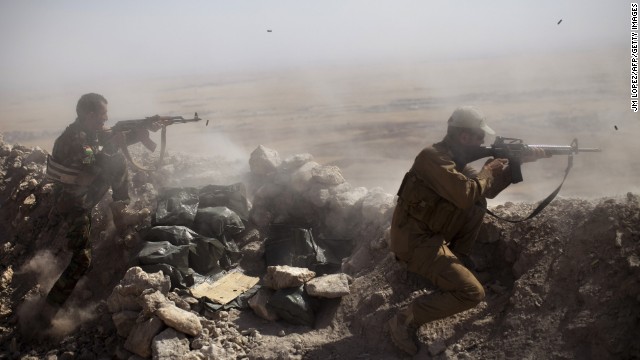 Kurdish Peshmerga fighters fire at ISIS militant positions from their position on the top of Mount Zardak, east of Mosul, Iraq, on Tuesday, September 9.
Kurdish Peshmerga fighters fire at ISIS militant positions from their position on the top of Mount Zardak, east of Mosul, Iraq, on Tuesday, September 9.  An Iraqi fighter jet flies over Amerli, Iraq, on September 3. Amerli had been under siege by ISIS militants.
An Iraqi fighter jet flies over Amerli, Iraq, on September 3. Amerli had been under siege by ISIS militants. 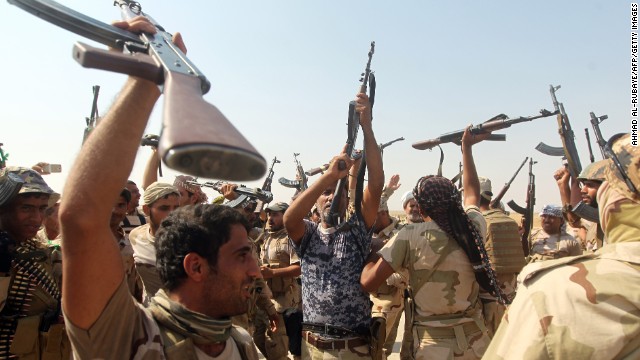 Iraqi volunteer fighters celebrate breaking the Amerli siege on Monday, September 1. ISIS militants had surrounded Amerli, 70 miles north of Baquba, Iraq, since mid-June.
Iraqi volunteer fighters celebrate breaking the Amerli siege on Monday, September 1. ISIS militants had surrounded Amerli, 70 miles north of Baquba, Iraq, since mid-June. 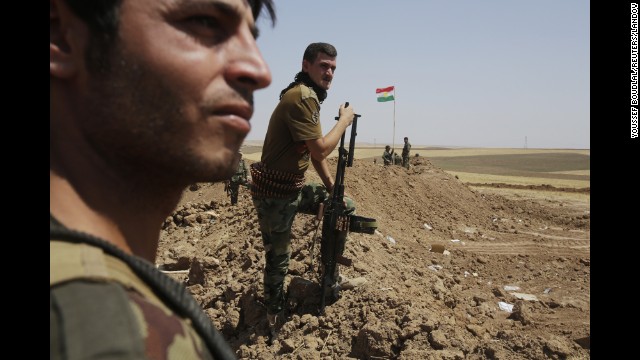 Kurdish Peshmerga forces stand guard at their position in the Omar Khaled village west of Mosul on Sunday, August 24.
Kurdish Peshmerga forces stand guard at their position in the Omar Khaled village west of Mosul on Sunday, August 24. 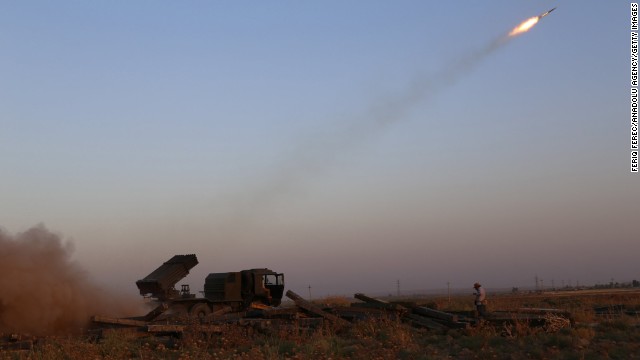 Kurdish Peshmergas fight to regain control of the town of Celavle, in Iraq's Diyala province, on August 24.
Kurdish Peshmergas fight to regain control of the town of Celavle, in Iraq's Diyala province, on August 24. 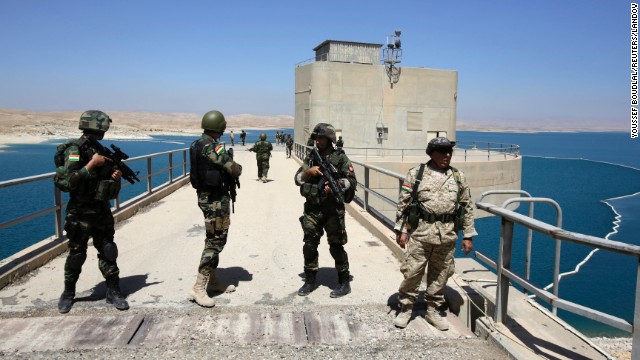 Peshmerga fighters stand guard at Mosul Dam in northern Iraq on Thursday, August 21. With the help of U.S. military airstrikes, Kurdish and Iraqi forces retook the dam from ISIS militants on August 18. A breach of the dam would have been catastrophic for millions of Iraqis who live downstream from it.
Peshmerga fighters stand guard at Mosul Dam in northern Iraq on Thursday, August 21. With the help of U.S. military airstrikes, Kurdish and Iraqi forces retook the dam from ISIS militants on August 18. A breach of the dam would have been catastrophic for millions of Iraqis who live downstream from it.  Displaced Iraqis receive clothes from a charity at a refugee camp near Feeshkhabour, Iraq, on Tuesday, August 19.
Displaced Iraqis receive clothes from a charity at a refugee camp near Feeshkhabour, Iraq, on Tuesday, August 19. 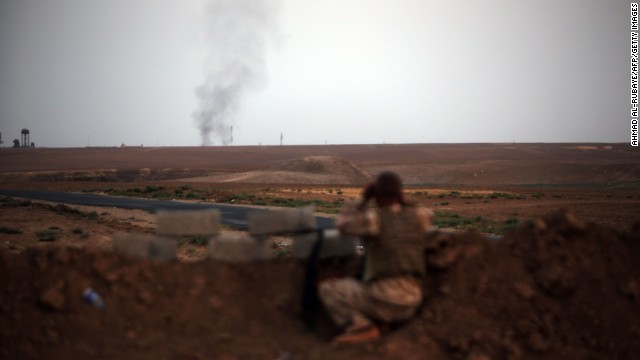 A fighter with Kurdish Peshmerga forces battles ISIS militants near Mosul on Monday, August 18.
A fighter with Kurdish Peshmerga forces battles ISIS militants near Mosul on Monday, August 18. 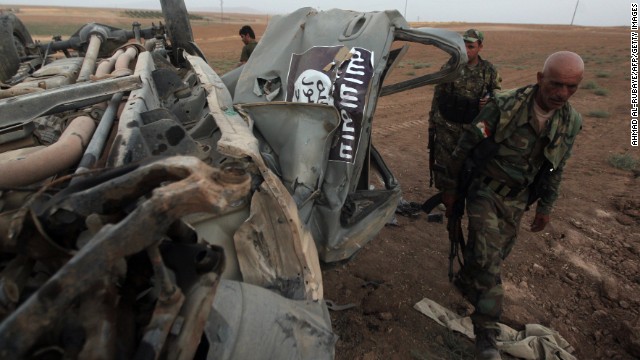 Peshmerga fighters inspect the remains of a car that reportedly belonged to ISIS militants and was targeted by a U.S. airstrike in the village of Baqufa, north of Mosul, on August 18.
Peshmerga fighters inspect the remains of a car that reportedly belonged to ISIS militants and was targeted by a U.S. airstrike in the village of Baqufa, north of Mosul, on August 18. 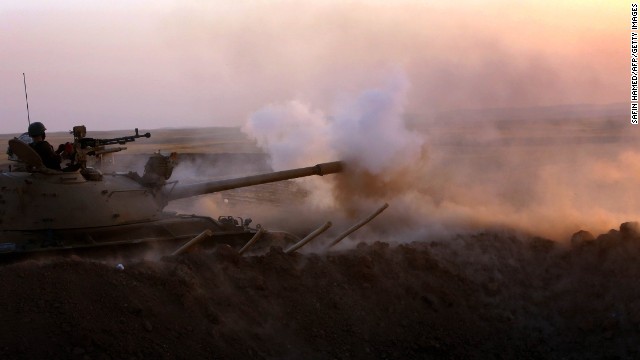 Kurdish Peshmerga fighters fire at ISIS in Khazair, Iraq, on Thursday, August 14.
Kurdish Peshmerga fighters fire at ISIS in Khazair, Iraq, on Thursday, August 14. 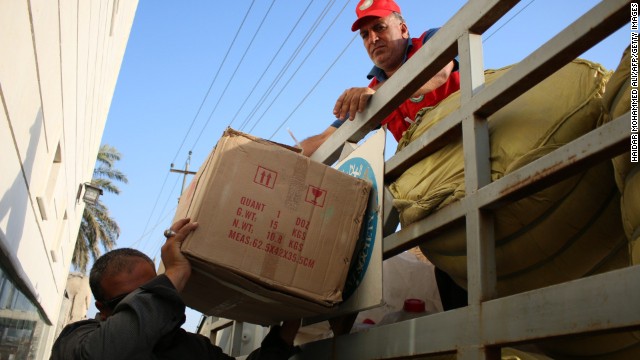 Volunteers of the Iraqi Red Crescent Society unload boxes of goods before distributing them August 14 to families who fled from ISIS.
Volunteers of the Iraqi Red Crescent Society unload boxes of goods before distributing them August 14 to families who fled from ISIS. 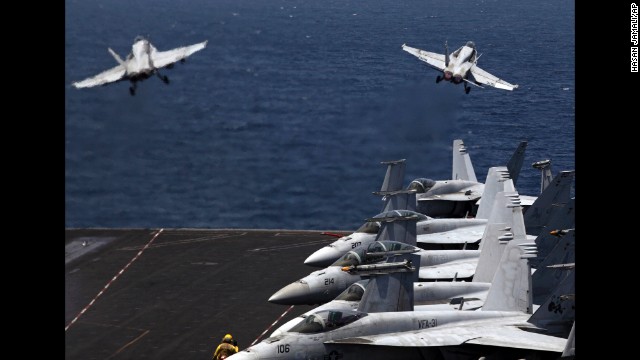 From the flight deck of the USS George H.W. Bush, which is in the Persian Gulf, two U.S. fighter jets take off for a mission in Iraq on Monday, August 11. U.S. President Barack Obama authorized airstrikes against Islamic militants and food drops for Iraqis who are trapped by the militants.
From the flight deck of the USS George H.W. Bush, which is in the Persian Gulf, two U.S. fighter jets take off for a mission in Iraq on Monday, August 11. U.S. President Barack Obama authorized airstrikes against Islamic militants and food drops for Iraqis who are trapped by the militants. 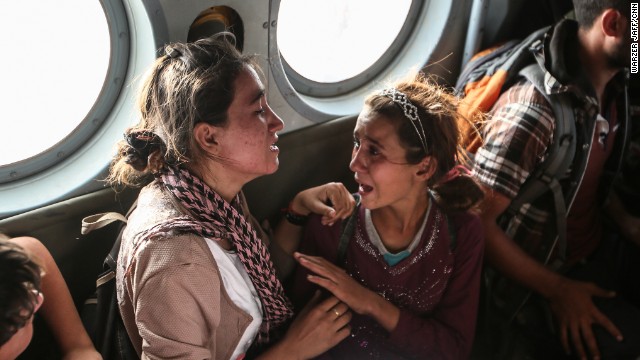 Aziza Hamid, a 15-year-old Iraqi girl, cries for her father while she and some other Yazidi people are flown to safety Monday, August 11, after a dramatic rescue operation at Iraq's Mount Sinjar. A CNN crew was on the flight, which took diapers, milk, water and food to the site where as many as 70,000 people were trapped by ISIS. But only a few of them were able to fly back on the helicopter with the Iraqi Air Force and Kurdish Peshmerga fighters.
Aziza Hamid, a 15-year-old Iraqi girl, cries for her father while she and some other Yazidi people are flown to safety Monday, August 11, after a dramatic rescue operation at Iraq's Mount Sinjar. A CNN crew was on the flight, which took diapers, milk, water and food to the site where as many as 70,000 people were trapped by ISIS. But only a few of them were able to fly back on the helicopter with the Iraqi Air Force and Kurdish Peshmerga fighters. 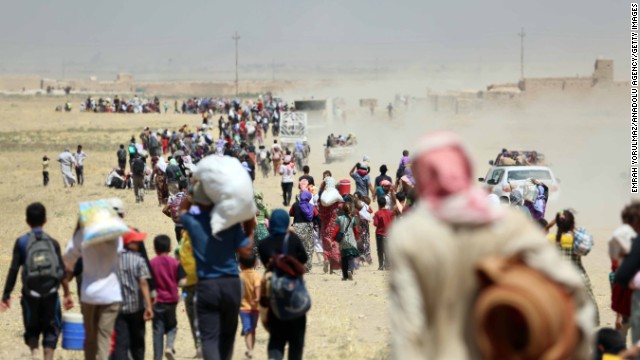 Thousands of Yazidis are escorted to safety by Kurdish Peshmerga forces and a People's Protection Unit in Mosul on Saturday, August 9.
Thousands of Yazidis are escorted to safety by Kurdish Peshmerga forces and a People's Protection Unit in Mosul on Saturday, August 9. 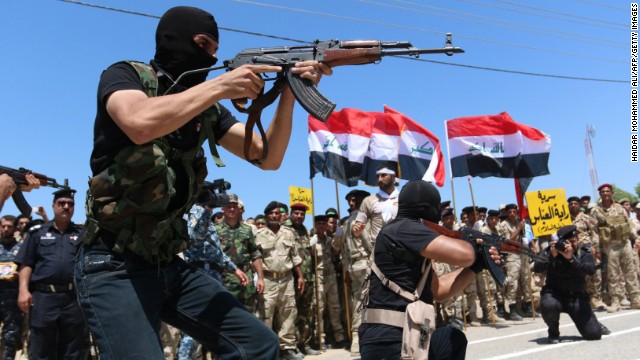 Iraqi Shiite volunteers who have joined government forces to fight ISIS take part in a training session near Basra, Iraq, on Thursday, August 7.
Iraqi Shiite volunteers who have joined government forces to fight ISIS take part in a training session near Basra, Iraq, on Thursday, August 7. 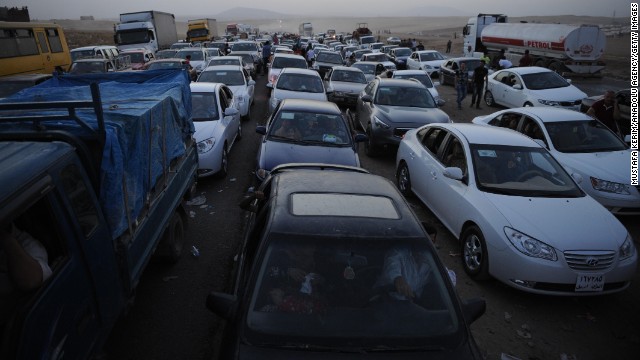 Thousands of Yazidi and Christian people flee Mosul on Wednesday, August 6, after the latest wave of ISIS advances.
Thousands of Yazidi and Christian people flee Mosul on Wednesday, August 6, after the latest wave of ISIS advances. 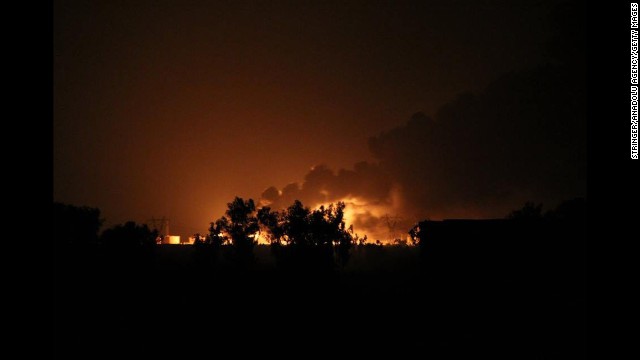 A Baiji oil refinery burns after an alleged ISIS attack in northern Selahaddin, Iraq, on Thursday, July 31.
A Baiji oil refinery burns after an alleged ISIS attack in northern Selahaddin, Iraq, on Thursday, July 31. 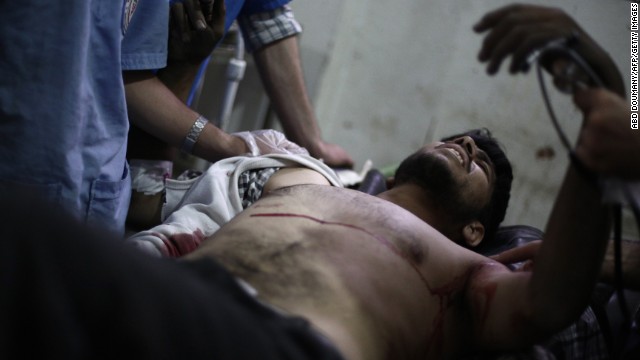 A Syrian rebel fighter lies on a stretcher at a makeshift hospital in Douma, Syria, on Wednesday, July 9. He was reportedly injured while fighting ISIS militants.
A Syrian rebel fighter lies on a stretcher at a makeshift hospital in Douma, Syria, on Wednesday, July 9. He was reportedly injured while fighting ISIS militants. 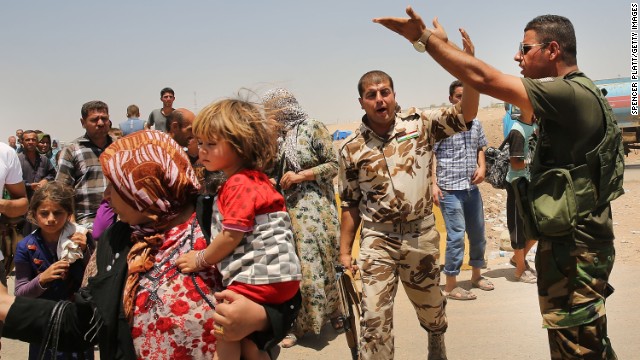 Iraqis who fled fighting in the cities of Mosul and Tal Afar try to enter a temporary displacement camp in Khazair on Wednesday, July 2.
Iraqis who fled fighting in the cities of Mosul and Tal Afar try to enter a temporary displacement camp in Khazair on Wednesday, July 2.  Peshmerga fighters check cars at the entrance of a temporary displacement camp in Khazair on Thursday, June 26.
Peshmerga fighters check cars at the entrance of a temporary displacement camp in Khazair on Thursday, June 26. 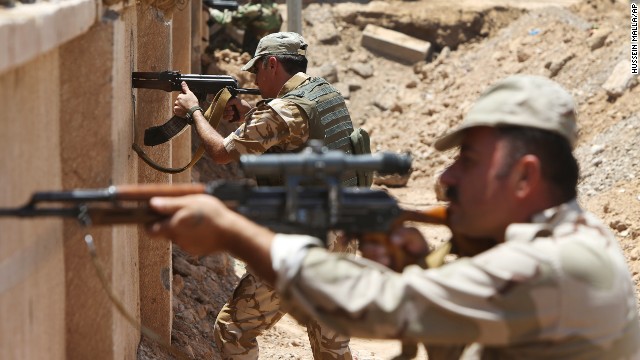 Kurdish Peshmerga take their positions behind a wall on the front line of the conflict with ISIS militants in Tuz Khormato, Iraq, on Wednesday, June 25.
Kurdish Peshmerga take their positions behind a wall on the front line of the conflict with ISIS militants in Tuz Khormato, Iraq, on Wednesday, June 25.  Peshmerga fighters clean their weapons at a base in Tuz Khormato on June 25.
Peshmerga fighters clean their weapons at a base in Tuz Khormato on June 25. 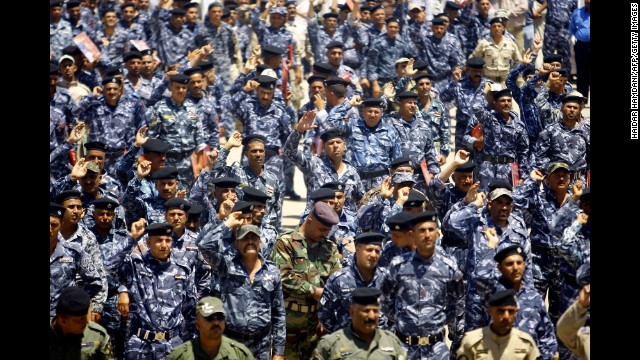 New army recruits gather in Najaf, Iraq, on Wednesday, June 18, following a call for Iraqis to take up arms against Islamic militant fighters.
New army recruits gather in Najaf, Iraq, on Wednesday, June 18, following a call for Iraqis to take up arms against Islamic militant fighters. 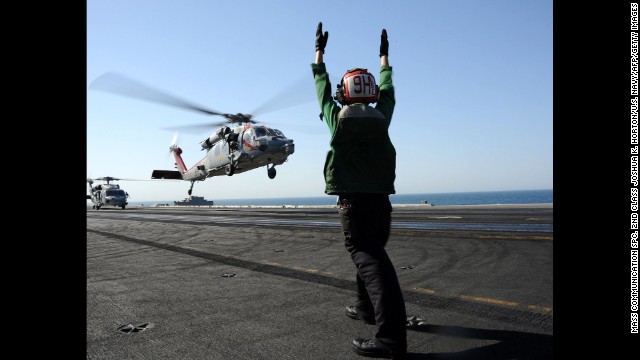 An MH-60R Sea Hawk helicopter lands on the aircraft carrier USS George H.W. Bush in the Persian Gulf on Tuesday, June 17.
An MH-60R Sea Hawk helicopter lands on the aircraft carrier USS George H.W. Bush in the Persian Gulf on Tuesday, June 17. 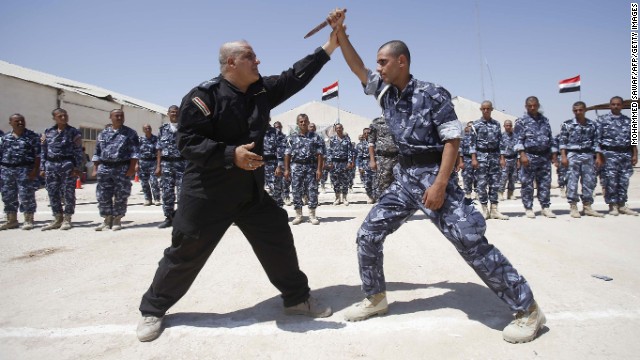 Newly recruited Iraqi volunteer fighters take part in a training session in Karbala, Iraq, on June 17.
Newly recruited Iraqi volunteer fighters take part in a training session in Karbala, Iraq, on June 17. 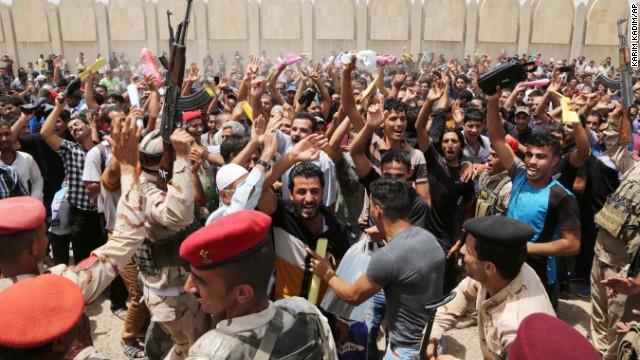 Iraqi men chant slogans outside of an army recruiting center to volunteer for military service Thursday, June 12, in Baghdad.
Iraqi men chant slogans outside of an army recruiting center to volunteer for military service Thursday, June 12, in Baghdad. 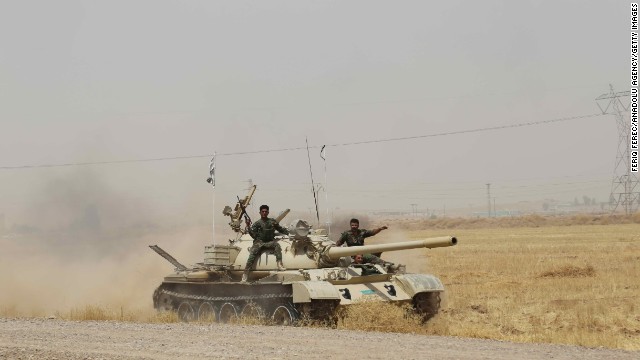 Kurdish Peshmerga forces, along with Iraqi special forces, deploy their troops and armored vehicles outside of Kirkuk, Iraq, on June 12.
Kurdish Peshmerga forces, along with Iraqi special forces, deploy their troops and armored vehicles outside of Kirkuk, Iraq, on June 12. 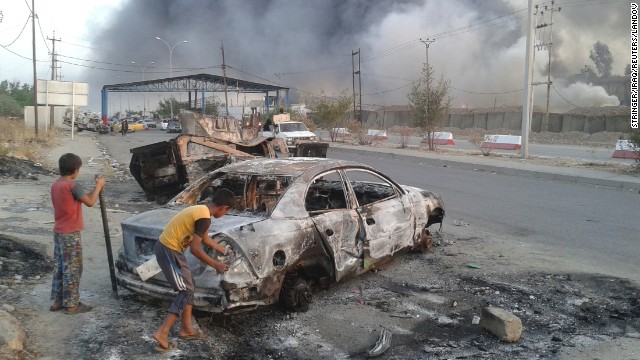 Children stand next to a burnt vehicle during clashes between Iraqi security forces and ISIS militants in Mosul on Tuesday, June 10.
Children stand next to a burnt vehicle during clashes between Iraqi security forces and ISIS militants in Mosul on Tuesday, June 10. 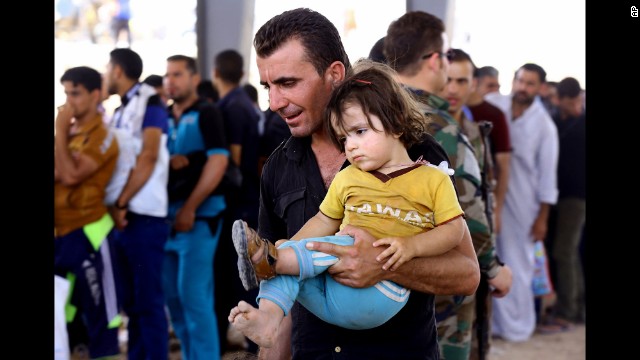 Civilians from Mosul escape to a refugee camp near Irbil, Iraq, on June 10.
Civilians from Mosul escape to a refugee camp near Irbil, Iraq, on June 10.
- ISIS publication justifies reasons for enslavement of women in captured areas
- Frida Ghitis: Is it any wonder that women in Iraq and Syria are now active in fighting ISIS?
- She says ISIS' treatment of women as loot for fighters could be used to entice recruits
- Ghitis: ISIS has provided everyone, especially women, even more reasons to fight back
Editor's note: Frida Ghitis is a world affairs columnist for The Miami Herald and World Politics Review. A former CNN producer and correspondent, she is the author of "The End of Revolution: A Changing World in the Age of Live Television." Follow her on Twitter @FridaGhitis. The opinions expressed in this commentary are solely those of the author.
(CNN) -- Just when you thought it was impossible for ISIS to become any more contemptible, the group in its latest publication boasts of its success in bringing the return of slavery. More specifically, it announced and provided elaborate justification for the enslavement of women.
We didn't need a new propaganda effort from the self-appointed Islamic State to know the nightmare that has befallen women in territories captured by its fighters. Now we've had a look at the twisted logic that rationalizes sexual exploitation, killing and enslavement of women and young girls.
Is it any wonder then that women in Iraq and Syria have moved to the forefront of the war against ISIS? They have taken up arms, organized civil protests and warned the world about the threat that ISIS poses.
A woman is leading Kurdish forces fighting ISIS in the city of Kobani, Syria. And a substantial number -- more than one third -- of the Kurdish battlefield troops in Syria are women.
One reason they fight is that women have more to lose than anyone else.
For a time, the rumors seemed so extreme, so outlandish, that they were met with a dose of skepticism: Talk of slave markets, mass kidnappings, women treated as spoils of war distributed among the victorious fighters, sounded like tales from a historic account, not of a 21st-century conflict.
 ISIS magazine: Slavery is Islamic law
ISIS magazine: Slavery is Islamic law  Woman: I am proud to fight, kill ISIS
Woman: I am proud to fight, kill ISIS  Meet the women fighting ISIS
Meet the women fighting ISIS  ISIS recruiting women
ISIS recruiting women But in 2014, using the Internet, ISIS described what it did with members of Iraq's Yazidi minority: "After capture, the Yazidi women and children were then divided according to Sharia amongst the fighters of the Islamic State. ..." The explanation included "scholarly analysis" to justify the religious logic and social benefits of reviving the slavery of women. "One should remember that enslaving the families of the kuffar -- the infidels -- and taking their women as concubines is a firmly established aspect of the Sharia, or Islamic law."
It seems pointless to discuss religious doctrine with a group determined to kill its way into the imposition of seventh-century norms more than 1,400 years after they were written. A number of top Muslim clerics have rejected ISIS' interpretation of Islamic law. And some Muslims argue the Quran is actually egalitarian.
ISIS, in contrast, finds slavery and the holding of concubines a beneficial practice, writing that "a number of contemporary scholars" say the end of slavery has led to an increase in "adultery, fornication, etc."
The latest publication confirms what human rights investigators and survivors of ISIS have reported. The United Nations says slave markets now operate in Raqqa, the ISIS "capital" in Syria, and in Mosul, until recently a modern city in Iraq.
U.N. investigators interviewed witnesses, who told of women taken captive by ISIS, sexually abused and handed to slave traders. The United Nations estimates there are at least 2,500 victims. Others say the number may be much higher.
When Kurdish forces recaptured Mosul Dam, they reportedly said they found a woman naked and tied up, who had been raped repeatedly by ISIS men. Similar reports have come from other ISIS-controlled areas.
Just like the publicized beheading of captives has a strategic purpose, the treatment of women as battlefield loot is a way of enticing new recruits.
But it is also a powerful motivation for women to join the fight.
In the battle over Kobani, just across the border from Turkey, ground troops are led by two top officers of the YPG, the Kurdish People's Protection Units. One of them is a woman, Mayssa Abdo, known in the battlefield as Narin Afrin. About 35% of YPG's forces are women. Then there is YPJ, the Women's Protection Unit, counting 7,500 uniformed fighters, some barely bigger than their rifles. Kurdish women from Turkey have volunteered to fight alongside their Kurdish brethren in Syria.
Inside Mosul, women organized resistance against ISIS' oppressive rule. The women's rights activist Sameera Salih al-Nuaimy denounced ISIS atrocities on social media. She was arrested, tortured and executed by an ISIS firing squad
Women physicians in Mosul organized a strike when ISIS ordered them to cover their faces. At least one of the strikers was executed, as have been countless female lawyers, doctors and other professional women.
A turning point in global attention to the threat posed by ISIS came in August, when a woman, a Yazidi legislator, took the floor in the Iraqi parliament, saying ISIS was committing genocide against Iraq's Yazidis. "Mr. Speaker," cried out Vian Dakhil, the only Yazidi member of parliament, "We are being slaughtered. We are being exterminated."
Since then, while the United States helped save thousands of Yazidis and started bombing ISIS without putting "boots on the ground," countless women, mostly Kurdish, have laced up their boots and headed to the battlefield.
The worst of ISIS treatment is reserved for "infidels," or for those defying their orders. In areas under ISIS control, women are required to observe strict clothing rules and are not allowed to leave the house without a male relative. Violators can be whipped or even executed. It's worth remembering that many of the women facing these restrictions had been living modern lives.
Just when it seemed ISIS could not be more offensive and threatening, it has provided everyone, especially, women even more reasons to fight back.
Read CNNOpinion's new Flipboard magazine
Follow us on Twitter @CNNOpinion.
Join us on http://ift.tt/1bl3g0P.
No comments:
Post a Comment